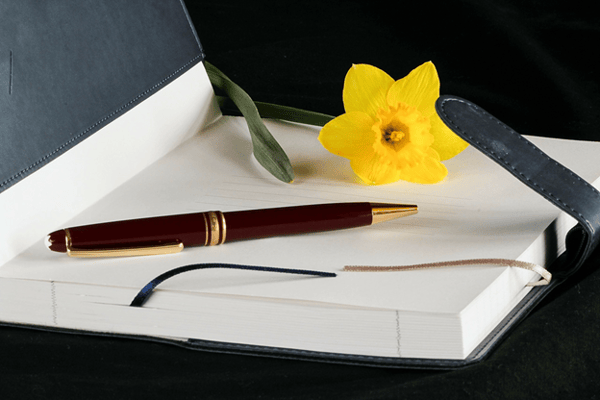This is a fight you never asked for. A fight you never wanted. A fight you and your dear ones certainly don’t deserve. But now it is here, and you and those you love must learn to live in the face of a terminal diagnosis.
In the midst of pain and fear, grief and anger, you might not even know where to begin. But it is possible to find peace and joy in the face of terminal illness. It is possible to build a beautiful life from every precious day. And it can begin by putting pen to paper.
Why Journaling?
To say that a terminal diagnosis shakes your world is a bit like saying that getting hit by a freight train stings a little bit. You’re probably struggling to make sense of this new reality, to clear your mind and settle your spirit just long enough to take stock and get a grasp on your suddenly changed life.
This is where journaling comes in. Especially in the early phases of your diagnosis, your mind is probably swirling with questions. Your doctors, friends, and family may be bombarding you with information. Facts about your diagnosis. Questions about your treatment strategy. Decisions you and your loved ones need to make together.
Having a journal can help you keep track of all the information coming your way, all the questions that assail your mind. Journaling can help you organize your thoughts and begin putting your world back in order again.
This can be a powerful tool for you as you consult with your doctors and nurses, for instance, because you will have a record of questions you need to discuss with them, concerns, both physical and emotional, that you need to address together. After all, your healthcare team’s role is not only to provide care, but to listen — and the journal, to whatever extent you want to share it with them, can be a tremendous help with that.
Above all, getting these things down on paper is going to help reduce your stress and restore a sense of focus and calm. A Cambridge study found, for example, that just 3 to 5 journaling sessions of 20 minutes or less resulted in significant physical and psychological benefits for those coping with trauma.
Likewise, in a study conducted at the University of Kansas, researchers found that women who had been diagnosed with breast cancer were healthier, both in mind and body, after three months of expressive journaling, which is journaling that focuses not just on recording facts but on recording one’s emotions.
Specifically, the study found that the women who journaled not just on the hard details of their illness and treatment, but also their thoughts and feelings, from their hopes and fears to their anger and their joys, had one-third fewer symptoms and cancer-related medical appointments.
No Wrong Way
The most important thing to keep in mind when you decide to start keeping a journal is that there’s no right or wrong way to do it. After all, unless and until you decide to share, your journal is for your eyes only.
So, on one particular day, you might just use your journal to keep track of appointments, lab results, medications, whatever. On another, your journal might be the repository of your rage and sadness. You might use it to vent everything you can’t or don’t want to say to your loved ones.
But what you’re likely going to find is that your journal evolves as you do. Having a record of your journey through your diagnosis can be a tremendous source of comfort, strength, and power as you face your difficult days and celebrate your good ones. It can provide much-needed perspective when doubts, fears, and confusion return.
Studies show that even one 20-minute expressive writing session is linked to a higher quality of life and better physical and mental health for those facing a life-threatening illness.
Be Consistent
True, I did just say that there are really no rules to keeping a journal, and I meant it. Except for one thing: to benefit from journaling, it helps to be consistent. Try to write something every day, even if it is just a line or two. That may be all you need, or all you can physically or emotionally muster, for that day.
But it’s enough, because even a sentence will be sufficient to commemorate and document that day. Even a few words will honor your experience, for good or bad, for that day.
A good way to help you establish that consistency is to set aside a specific time each day to write in your journal and be faithful. You might find that it’s helpful to journal just before you go to sleep at night because it helps you to slough off the worries and the stresses of the day.
Or you might find that it helps to include journaling in your morning routine. Starting each morning by writing for just 15 or 20 minutes can help you clear your mind, set your goals for the day, and begin with a positive perspective.
For example, if you use your morning journaling session to write down the things you are most grateful for, you’re going to approach your day from a perspective of gratitude and optimism. And that’s not just good for your outlook. It’s also good for your health. Gratitude has been shown to reduce stress, promote healthy sleep, and decrease depression. It also helps us to improve our relationships and prioritize what matters most in our lives.
The Takeaway
A terminal diagnosis is not fair. It’s not fair to you, and it’s not fair to the people who love you. You’ve been recruited to a club you never thought you would join. But with that diagnosis comes revelation — of the preciousness of life and love, of the sacredness of each day, and of the power that you hold deep inside to face one of life’s greatest challenges with grace and dignity.
Journaling can help you to harness that power, to marshall it for peace and focus, to archive the highs and lows that each day brings, and to document the most profound journey any of us will ever take. Above all, with every writing session, you are honoring your own path, recording your experience, and supporting your own physical and emotional wellness. Journaling is both an outlet and an instrument, a funnel into which every emotion can be poured, a conduit for gaining perspective, and a tool for giving thanks.
 Author bio:
Author bio:
Frankie Wallace is a freelance writer from the Pacific Northwest. She writes about a variety of topics and spends her free time gardening.



Leave Comment